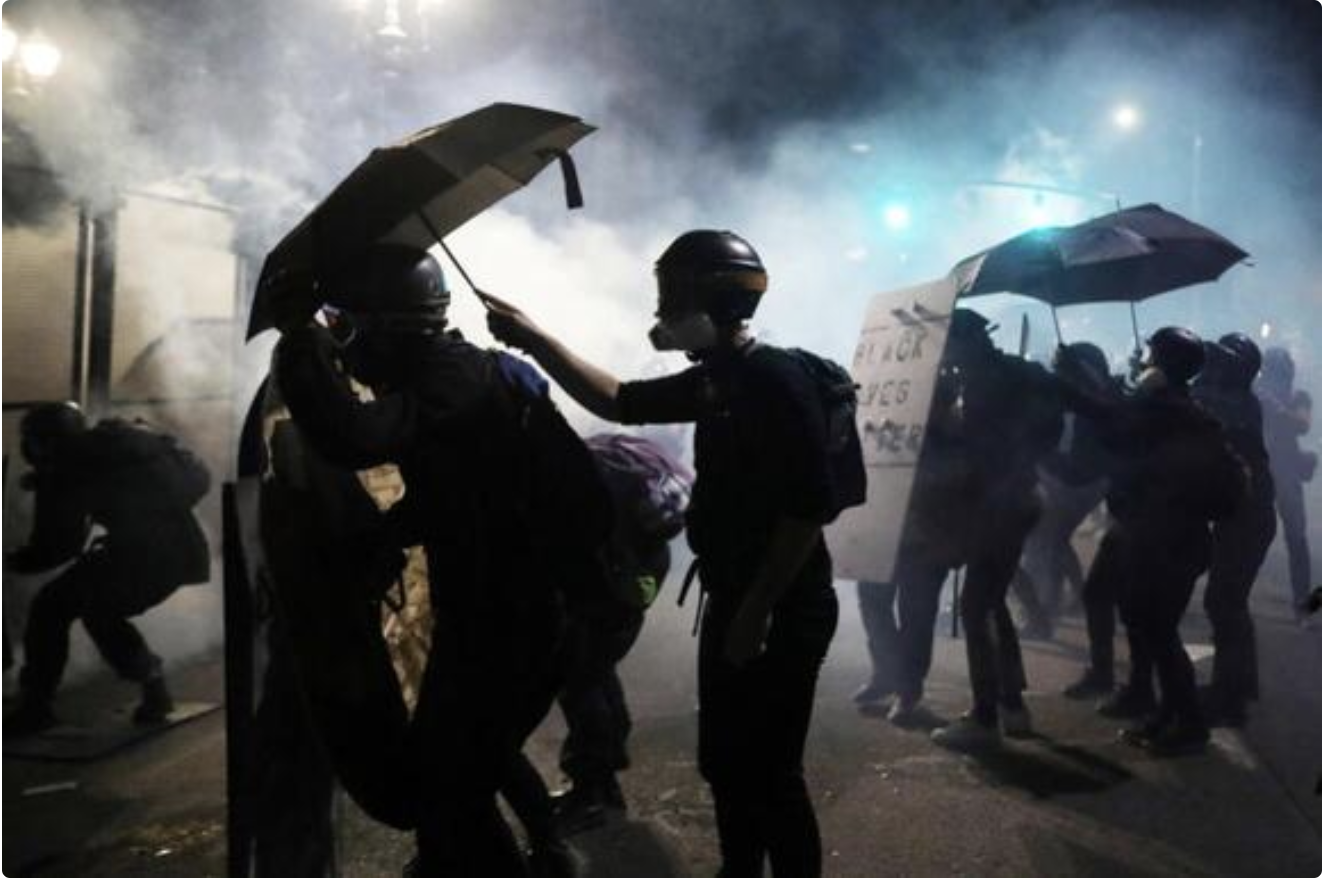Oct. 4 (UPI) — U.S. Defense Secretary Pete Hegseth reportedly considered deploying the 82nd Airborne Division, one of the Army’s most elite combat units, to Portland, Oregon, as protests and clashes continued outside the city’s Immigration and Customs Enforcement (ICE) facility, according to reports by The Minnesota Star Tribune and The Guardian.
The revelation comes amid growing scrutiny of the Trump administration’s response to renewed unrest in Portland, where demonstrations involving Antifa-affiliated groups and other activists have turned violent in recent weeks. The Star Tribune obtained images of text messages that allegedly show Deputy Homeland Security Investigations Adviser Anthony Salisbury discussing, in a “crowded, public space,” the possible use of the paratrooper unit to “restore order” in Oregon’s largest city.
Instead of sending the airborne division, the administration opted to deploy National Guard troops to Portland, citing escalating violence and threats against federal law enforcement.
Also Read
DHS: “Antifa and Other Extremists Haven’t Stopped Us”
The Department of Homeland Security (DHS) said in a Sept. 26 news release that “Antifa and other left-wing extremists have shot, attacked, issued death threats against and incited riots against law enforcement.” DHS Assistant Secretary Tricia McLaughlin added, “They’re not even slowing us down.”
According to DHS, rioters have “repeatedly attacked and laid siege” to an ICE processing center in Portland, vandalizing property and harassing federal officers. The agency also accused the Rose City Antifa organization of “doxing” ICE employees by publishing their personal details and home addresses online.
The federal government has cited these incidents as justification for increased security measures — including the controversial mobilization of National Guard forces — in the city’s South Waterfront area.
DOJ Investigating Portland Police for “Selective Enforcement”
In a parallel development, White House Press Secretary Karoline Leavitt announced Friday that the Department of Justice has opened an investigation into the Portland Police Bureau (PPB) and city officials for alleged “selective law enforcement.”
The investigation follows the arrest of conservative journalist and influencer Nick Sortor, who was detained by local police during a protest outside the ICE building. Sortor, who has close ties to right-wing media networks, was arrested alongside two others for disorderly conduct.
Leavitt claimed Sortor “was ambushed by Antifa and was defending himself from assaults,” accusing Portland police of failing to protect him.
The DOJ is also probing an incident in which The Post Millennial reporter Katie Daviscourt was allegedly struck in the head with a flagpole by a masked protester earlier in the week. Critics say officers failed to intervene or detain the suspect.
Federal investigators have demanded body-camera footage, police reports, and communications related to both incidents. Additionally, DOJ attorneys Harmeet Dhillon and R. Jonas Geisseler have requested records about the Portland City Council’s move to close the ICE facility over alleged zoning violations, which federal officials see as an attempt to obstruct immigration enforcement operations.
“We note a consistent theme in these three allegations — all three would choose one viewpoint over another,” the DOJ memo stated, according to Oregon Public Broadcasting.
Antifa Under Renewed Federal Scrutiny
The DOJ is also expanding its investigation into Rose City Antifa, one of the nation’s oldest and most active anti-fascist collectives. Federal officials describe the group as “a leading cell of violent left-wing extremism.”
President Donald Trump formally designated Antifa a domestic terrorist organization on Sept. 22, citing the group’s alleged involvement in violent confrontations in Portland and other U.S. cities.
Despite Antifa’s decentralized structure, law enforcement agencies across the country have linked several members to organized acts of violence. In June 2024, San Diego County District Attorney Summer Stephan announced that 11 individuals connected to a Southern California Antifa cell had been convicted and sentenced to up to five years in prison for violent acts committed during a January 2021 demonstration in Pacific Beach.
According to prosecutors, the group coordinated online before the event, dressing in black clothing and protective gear and carrying weapons to attack attendees of a conservative rally. The defendants faced a combined 29 felony charges, including assault with a deadly weapon, use of tear gas, conspiracy to commit riot, and violations of the Racketeer Influenced and Corrupt Organizations (RICO) Act.
Nine of the accused pleaded guilty, while two were convicted at trial. The case marked one of the first successful RICO prosecutions of self-identified Antifa members in U.S. history.
Federal Response Fuels Local Tensions
In Portland, the presence of federal officers and National Guard troops has further strained relations between city leaders and Washington. Local officials, including Governor Tina Kotek and Mayor Dan Wilson, have criticized the federal government’s portrayal of Portland as a “war-ravaged” city — language Trump has repeatedly used to justify military intervention.
Civil rights advocates argue that the deployment of troops and the threat of airborne units represent a dangerous federal overreach. “Bringing combat forces into a domestic protest environment is unconstitutional and inflammatory,” one Portland-based legal group said in a statement.
Meanwhile, DHS and the Pentagon maintain that their actions are necessary to “defend federal property and personnel” from organized attacks.
The 82nd Airborne and a Chilling Precedent
Had Hegseth gone through with the deployment, it would have marked one of the most extreme uses of U.S. military power in a domestic setting in modern history. The 82nd Airborne Division, based at Fort Liberty, North Carolina, is known for rapid-deployment combat operations in global conflict zones. Deploying it to an American city would have raised profound constitutional and political questions under the Posse Comitatus Act, which limits military involvement in civilian law enforcement.
Ultimately, Hegseth’s consideration of such a move underscores the heightened political tension surrounding Portland’s ongoing protests — where one city block has become a flashpoint for a national debate over federal authority, public safety, and the limits of protest.
For now, the 82nd Airborne remains grounded, but the discussion has reignited fears that the line between military defense and domestic control is becoming dangerously blurred.












